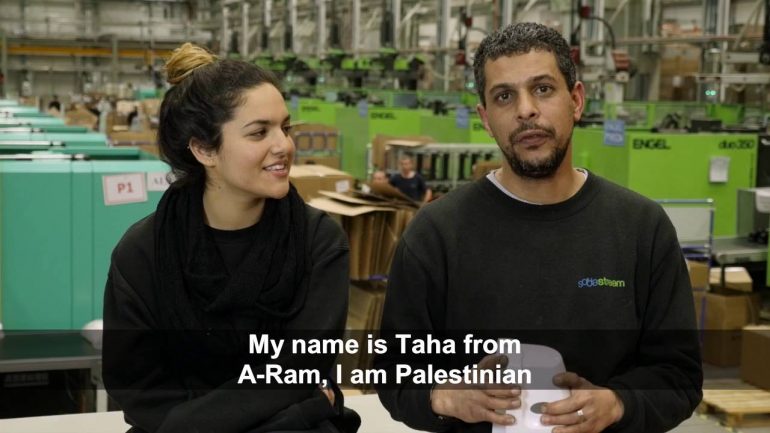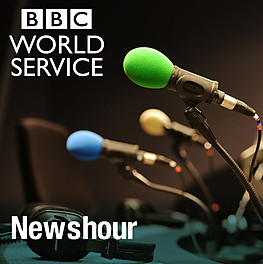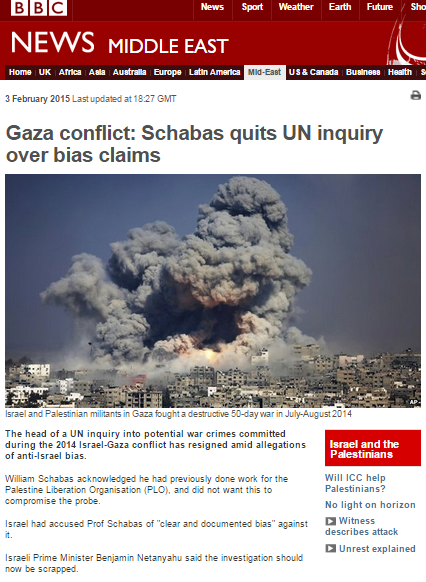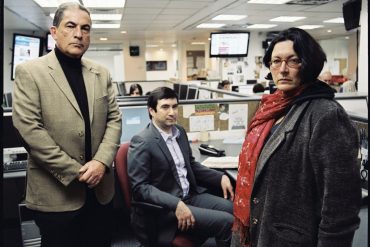Following a long and misleading introduction (discussed in part one of this post, from 01:06 here), the presenter of the June 2nd edition of the BBC World Service radio programme ‘Business Matters’, Roger Hearing, got to his interview with the BDS campaign leader Omar Barghouti – introduced as follows: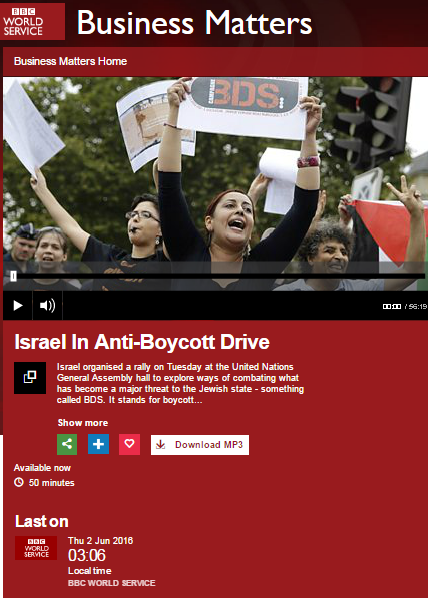
“Well, the man behind it all – strangely enough – lives in Israel in the northern city of Acre [Acco]. Omar Barghouti was born in Qatar but comes from a Palestinian family. He’s now under a kind of travel ban. He is a permanent resident of Israel but Israel has refused to give him a travel permit and says his residency rights are being reconsidered, as he told me when I spoke to him in Acre.”
Barghouti: “Israel has effectively banned any travel for me. As of the end of April they rejected a request to renew my travel document without which I cannot leave or re-enter the country.”
Barghouti’s residency in Israel is by virtue of his marriage to an Israeli citizen and he carries a Jordanian passport. Due to his anti-Israel activities, his residency status is indeed currently under review by the Ministry of the Interior.
Hearing went on:
“Well let’s look at the whole BDS campaign itself because clearly it has caused a lot of controversy. It stands for boycott, divestment and sanctions. A lot of people say it’s also a way, really, of…well, some people see it as antisemitic, frankly. They see it as…because it’s directed against the Jewish state, almost inevitably it must be characterised as an antisemitic campaign.”
Hearing failed to clarify to listeners that the BDS campaign is viewed as antisemitic because it singles out the Jewish state alone and because it negates the right of Jews to self-determination. Listeners were hence ill-equipped to put Barghouti’s jargon laden responses into their appropriate context.
“Absolutely not. BDS is an inclusive movement for human rights. It rejects all forms of racism including antisemitism. It’s the same…the smear sounds as if you say the anti-apartheid movement in South Africa was anti-white. Absolutely not: it was anti-apartheid. The fact that Israel claims a certain identity is irrelevant. Whether Israel claims to be an Islamic state, Christian state, Jewish state or any other state – it doesn’t matter. As long as it has a regime of occupation, settler colonialism and apartheid, we’ll continue to resist it, to gain our rights under international law. And we chose this non-violent, yet very effective, movement of BDS that is inspired by the anti-apartheid movement in South Africa and by the civil rights movement in the United States.”
Failing to challenge Barghouti’s false allegations of “settler colonialism” and “apartheid” or to provide any of the context necessary for listeners to understand what brought about “occupation”, Hearing went on:
“Well, let me give you one potential difference, ah…Mr Barghouti. The anti-apartheid campaign was very much to change the nature of the government of South Africa but it wasn’t to end the existence of South Africa. Many people say what you’re trying to do is to end the existence of the State of Israel. Do you believe the State of Israel should exist or not?”
Barghouti used that opportunity to further promote the inaccurate apartheid analogy:
“Well, ending the existence of a regime of oppression as they did in South Africa – they ended the existence of a regime of oppression, of apartheid – that’s exactly what BDS aims to end.”
Hearing continued:
“Do you aim to end the existence of the State of Israel? It’s a very simple question. Because Israel is a member of the United Nations. It’s an internationally recognised state.”
Barghouti was again allowed to side-step the issue.
“We aim to end the system of oppression. We don’t aim to end the existence of anyone or anything…”
Hearing: “Including the State of Israel?”
Barghouti: “We…we are aiming to end the existence of this regime of apartheid and occupation – as apartheid was ended, as the Jim Crow south was ended in the United States.”
Hearing: “By which you mean the occupation of the West Bank?”
Barghouti: “The occupied occupation; because BDS is anchored in international law we adopt the international law definitions. So when we say occupied territories we’re referring to the 1967 occupied territories – that is Gaza, the West Bank including East Jerusalem and the Golan Heights.”
Hearing’s failure to bring into the discussion the BDS campaign’s stance concerning the ‘right of return’ of Palestinian refugees to Israel (recently described by Barghouti as the “most important” of its demands) – and the intentions and consequences of such a proposal – means that audiences were left with nothing more than Barghouti’s deliberately misleading PR spin. Hearing then changed the subject:
“Let’s talk about BDS itself. What is the mechanism of this? What do you want people involved in the campaign to do? Not buy any Israeli goods at all?”
The conversation closed with more propaganda jargon from Barghouti:
“BDS aims at isolating Israel’s regime of oppression – as South African apartheid was isolated – in the academic, cultural, economic – as well as military – spheres. So ultimately we want a full boycott, full divestment and full sanctions. However, BDS is a global inclusive movement. It’s a decentralised movement. It is led by the largest coalition in Palestinian society but it’s decentralised so we believe in the principle of context sensitivity which means activists in any country, in any specific context, decide what works best in their context. Many partners decide to boycott just settlement products. Others go for a full boycott.”
Notably, Hearing did not question Barghouti on the topic of BDS’s impact on Palestinians working for Israeli companies or on its stance of opposition to ‘normalisation’. His failure to make any meaningful challenge to Barghouti’s PR messaging means that audiences not only went away without any real understanding of what the BDS movement aims to bring about, but were actually left with an impression which contradicts the facts. Those aims – and insight into what Omar Barghouti really means when he says “apartheid” – were amply evident in an interview he gave a few weeks before this one.
“BARGHOUTI: In fact, most partners and supporters of BDS completely support the three planks in our BDS call of 2005, which is ending the occupation, ending the racial discrimination in Israel and the system of apartheid and right of return. So we’re not aware of partners who do not support the right of return as a basic UN stipulated right.
All refugees, be they Jewish refugees from World War II to refugees from Kosovo, have that right. This is in international law and Palestinians should not be excluded. It’s quite racist to say that the return of Palestinian refugees would end Israeli apartheid and that’s bad because? What is so wrong about refugees having the right to return home? If that disturbs an apartheid system that’s premised on being exclusionary and racist and that does not want to see people gain their rights, what’s the argument there?” [emphasis added]
Yes – Omar Barghouti thinks that Jewish self-determination in the one and only Jewish state in the world is “apartheid”. His disingenuous reply to Hearing that “we don’t aim to end the existence of anyone or anything…” conceals the fact that the crux of the BDS campaign’s aims is to replace the Jewish state with one in which Jews are a minority.
Roger Hearing missed – or passed up on – the opportunity to ensure that BBC audiences went away from this interview with an understanding of that lynchpin fact. In his subsequent conversation with a representative from the Israeli embassy in London he did however take great care to ensure that listeners were left with one particular impression.
“Would they [BDS] be right to boycott what comes out of illegal Israeli settlements on the West Bank?”
“Well it’s illegal…in international law it’s illegal to have the settlement there, isn’t it?”
“If I’m looking as a business and I say I’m going to boycott something that is coming from a place that is deemed illegal in international law, that’s hardly unreasonable, is it?”
Yet again we have here an additional example of how the BBC has of late abandoned its formerly used mantra on ‘settlements’ and ‘international law’ in favour of messaging which fails even more to meet its commitments to impartial reporting.
Related Articles:
Why BDS is antisemitic – David Hirsh (Engage)
BDS, Academic/Cultural Boycott of Israel, and Omar Barghouti (CAMERA)

